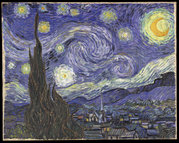Bipolar disorder
Bipolar disorder, still often referred to colloquially as manic-depression, is a mood disorder marked by episodes of clinically significant impairment due to mania or depression. more...
Emil Kraepelin, who first described the illness and coined the term "manic depression", noted in his original delineation of the disease that intervals of acute illness, manic or depressive, were generally punctuated by relatively symptom-free intervals in which a patient was able to function normally.
Diagnostic criteria
The DSM-IV-TR details two general profiles of bipolar disorder, Bipolar I and Bipolar II. Bipolar I is characterized by alternating episodes of full-blown mania and depression, while Bipolar II, the less severe and more common type of the disorder, is characterized by episodes of hypomania and depression.
Criteria for a MANIC EPISODE (DSM-IV-TR):
A. A distinct period of abnormally and persistently elevated, expansive, or irritable mood, lasting at least 1 week (or any duration if hospitalization is necessary).
B. During the period of mood disturbance, three (or more) of the following symptoms have persisted (four if the mood is only irritable) and have been present to a significant degree:
(1) inflated self-esteem or grandiosity (2) decreased need for sleep (e.g., feels rested after only 3 hours of sleep) (3) more talkative than usual or pressure to keep talking (4) flight of ideas or subjective experience that thoughts are racing (5) distractibility (i.e., attention too easily drawn to unimportant or irrelevant external stimuli) (6) increase in goal-directed activity (either socially, at work or school, or sexually) or psychomotor agitation (7) excessive involvement in pleasurable activities that have a high potential for painful consequences (e.g., engaging in unrestrained buying sprees, sexual indiscretions, or foolish business investments)
C. The symptoms do not meet criteria for a Mixed Episode.
D. The mood disturbance is sufficiently severe to cause marked impairment in occupational functioning or in usual social activities or relationships with others, or to necessitate hospitalization to prevent harm to self or others, or there are psychotic features.
E. The symptoms are not due to the direct physiological effects of a substance (e.g., a drug of abuse, a medication, or other treatment) or a general medical condition (e.g., hyperthyroidism).
Criteria for a MAJOR DEPRESSIVE EPISODE (DSM-IV-TR):
A. Five (or more) of the following symptoms have been present during the same 2-week period and represent a change from previous functioning; at least one of the symptoms is either (1) or (2).
(1) depressed mood most of the day, nearly every day, as indicated by either subjective report (e.g., feels sad or empty) or observation made by others (e.g., appears tearful). Note: In children and adolescents, can be irritable mood. (2) markedly diminished interest or pleasure in all, or almost all, activities most of the day, nearly every day (as indicated by either subjective account or observation made by others) (3) significant weight loss when not dieting or weight gain (e.g., a change of more than 5% of body weight in a month), or decrease or increase in appetite nearly every day. Note: In children, consider failure to make expected weight gains. (4) Insomnia or Hypersomnia nearly every day (5) psychomotor agitation or retardation nearly every day (observable by others, not merely subjective feelings of restlessness or being slowed down) (6) fatigue or loss of energy nearly every day (7) feelings of worthlessness or excessive or inappropriate guilt (which may be delusional) nearly every day (not merely self-reproach or guilt about being sick) (8) diminished ability to think or concentrate, or indecisiveness, nearly every day (either by subjective account or as observed by others) (9) recurrent thoughts of death (not just fear of dying), recurrent suicidal ideation without a specific plan, or a suicide attempt or a specific plan for committing suicide
Read more at Wikipedia.org



